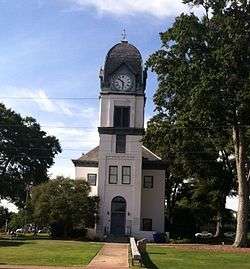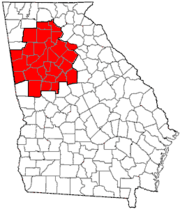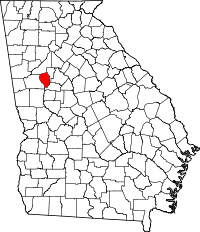Fayetteville, Georgia
| Fayetteville, Georgia | |
|---|---|
| City | |
|
Fayette County Courthouse | |
| Motto: "A History with a Future" | |
 Location in Fayette County and the state of Georgia | |
| Coordinates: 33°26′52″N 84°27′42″W / 33.44778°N 84.46167°WCoordinates: 33°26′52″N 84°27′42″W / 33.44778°N 84.46167°W | |
| Country | United States |
| State | Georgia |
| County | Fayette |
| Established | March 28, 1822 |
| Incorporated (town) | 1823 |
| Incorporated (city) | 1888 |
| Government | |
| • Type | Council/Manager |
| • Mayor | Ed Johnson |
| • City Manager | Ray Gibson |
| Area | |
| • Total | 11.1 sq mi (28.7 km2) |
| • Land | 10.9 sq mi (28.2 km2) |
| • Water | 0.2 sq mi (0.4 km2) |
| Elevation | 1,030 ft (313.9 m) |
| Population (2015) | |
| • Total | 16,990 |
| • Density | 1,464/sq mi (565.2/km2) |
| Time zone | Eastern (EST) (UTC-5) |
| • Summer (DST) | EDT (UTC-4) |
| ZIP codes | 30214-30215 |
| Area code(s) | 770 404, 678 |
| FIPS code | 13-28968[1] |
| GNIS feature ID | 0314089[2] |
| Website |
www |
Fayetteville is a city in Fayette County, Georgia, United States. As of the 2010 census, the city had a population of 15,945,[3] up from 11,148 at the 2000 census. The city is the county seat of Fayette County.[4] Fayetteville is located 22 miles (35 km) south of downtown Atlanta.[5]
History
Fayetteville was founded in 1822 as the seat of the newly formed Fayette County, organized from territory ceded by the Creek people under a treaty with the United States during the early period of Indian removal from the Southeast. Both city and county were named in honor of the Revolutionary War hero the Marquis de Lafayette. Fayetteville was incorporated as a town in 1823 and as a city in 1909.[6]
The area was developed for cotton plantations, with labor provided by enslaved African Americans, who at one time comprised the majority of the county's population. Fayetteville became the trading town for the agricultural area. In the 20th century, as agriculture became more mechanized, many African-American workers left in the Great Migration to northern and midwestern industrial cities, which had more jobs and offered less oppressive social conditions.
Demographics
| Historical population | |||
|---|---|---|---|
| Census | Pop. | %± | |
| 1880 | 138 | — | |
| 1890 | 380 | 175.4% | |
| 1900 | 430 | 13.2% | |
| 1910 | 709 | 64.9% | |
| 1920 | 952 | 34.3% | |
| 1930 | 796 | −16.4% | |
| 1940 | 832 | 4.5% | |
| 1950 | 1,032 | 24.0% | |
| 1960 | 1,389 | 34.6% | |
| 1970 | 2,160 | 55.5% | |
| 1980 | 2,715 | 25.7% | |
| 1990 | 5,827 | 114.6% | |
| 2000 | 11,148 | 91.3% | |
| 2010 | 15,945 | 43.0% | |
| Est. 2015 | 16,990 | [7] | 6.6% |
As of the 2010 census,[9] there were 15,945 people, 6,006 households, and 4,264 families residing in the city. The racial makeup of the city was 55.0% White, 33.9% African American, 0.4% Native American, 6.6% Asian, 0.1% Pacific Islander, 1.3% from other races, and 2.8% from two or more races. Hispanic or Latino of any race were 4.8% of the population.
Out of the 6,006 households, 39.7% had individuals under the age of 18. 51.8% of households were married couples living together, 16.0% had a female householder with no husband present, and 29.0% were non-families. 26.4% of all households were made up of individuals, and 12.0% had someone living alone who was 65 years of age or older. The average household size was 2.59, and the average family size was 3.14.
In the city, the age distribution was 26.7% under the age of 18, 7.4% from 18 to 24, 9.1% from 25 to 34, 15.4% from 35 to 44, 15.9% from 45 to 54, 11.4% from 55 to 64, and 14.0% who were 65 years of age or older. The median age was 39.9 years. The population was 54.4% female and 45.6% male.
As of the most recent community survey, the median income for a household in the city was $62,037 and the median income for a family was $81,613. About 6.5% of families and 8.9% of the population were below the poverty line, including 13.3% of those under age 18 and 6.1% of those age 65 or over.
Education
Fayette County School District
The Fayette County School District holds pre-school to grade twelve, and consists of fifteen elementary schools, five middle schools, and five high schools, as well as an alternative education program and Open Campus for middle and high school students.[10] The district has 1,379 full-time teachers and over 20,756 students.[11]
Fayette County High School, Whitewater High School, Sandy Creek High School, McIntosh High School and Starr's Mill High School serve the Fayetteville area.
Private schools include Counterpane School, Our Lady of Mercy Catholic High School, and Grace Christian Academy.
Points of interest
The Fayette County Courthouse, built in 1825 four years after the county and town's founding, is the oldest surviving courthouse in Georgia. The courthouse is located in the center of the Fayetteville town square. Since the construction of a new courthouse, it has been adapted for use as the local welcome center, and holds offices for Fayetteville Main Street and the Fayette County Development Authority.
The Holliday-Dorsey-Fife House was built in 1855 by John Stiles Holliday, uncle of the western gambler John Henry "Doc" Holliday. The house is now open to the public, Tuesday - Saturday, as the Holliday Dorsey Fife Museum.
Pride Gardens was founded by gay advocate Niles Carl to commemorate those lost to AIDS in Georgia since 1980.
The Margaret Mitchell Library, built in 1948 and named in honor of the author, serves as the headquarters of the Fayette County Historical Society. Among its holdings are Civil War and genealogical records.
Fun Junction USA, formerly Dixieland Fun Park, established in 1990, is the third largest amusement park in Georgia and has received awards for its annual Halloween festival. In 2011, a lawsuit filed by an African-American employee prompted the NAACP to boycott the park after the owners were accused of racial profiling. In 2013, the owner John Williams was sued in court on charges of using racial epithets in reference to black go-kart operators.
Pinewood Atlanta Studios opened here in 2014; it is owned and operated by the noted Pinewood Studios of London, United Kingdom. It is the largest film and television production studio in the United States outside the state of California.
Notable people
- Paris Bennett, American Idol Season 5: fifth place finalist
- Nancy Benoit, former professional wrestling manager
- Chris Benoit, former professional wrestler
- Big Boi, rapper/actor
- Brandon Boykin, football player for the Philadelphia Eagles
- Zac Brown, Grammy-Award winning country music singer
- Kandi Burruss, former Xscape member
- Matthew Daniels, football player for the St. Louis Rams
- Creflo Dollar, televangelist
- Hugh M. Dorsey, governor of Georgia
- Emmanuel Lewis, actor
- Christopher Massey, actor, musician, director, film producer
- Kyle Massey, actor, musician, Dancing with the Stars
- Ann Nesby, Grammy-award winning singer/actress
- Kelley O'Hara, soccer player for the United States women's national soccer team
- Paul Orndorff, professional wrestler
- R. Dean Fuller, legendary Chiropractor
- Tyler Perry, filmmaker, playwright, actor
- Plumb (born Tiffany Arbuckle Lee), songwriter, recording artist, performer and author
- Keshia Knight Pulliam, actress, The Cosby Show, Tyler Perry's House of Payne
- William Regal (born Darren Matthews), English professional wrestler
- Rick Ross, rapper
- Ferrol Sams, author
- Speech, leader of Arrested Development
- Hossein Khosrow Ali Vaziri ("The Iron Sheik"), Iranian professional wrestler
- Anna Watson, "The World's Strongest Cheerleader"
- Gary Anthony Williams, star of Special Agent Oso on Disney Channel
References
- ↑ "American FactFinder". United States Census Bureau. Retrieved 2008-01-31.
- ↑ "US Board on Geographic Names". United States Geological Survey. 2007-10-25. Retrieved 2008-01-31.
- ↑ http://quickfacts.census.gov/qfd/states/13/1328968.html
- ↑ "Find a County". National Association of Counties. Archived from the original on May 10, 2015. Retrieved 2011-06-07.
- ↑ Fayetteville, Georgia facts
- ↑ Hellmann, Paul T. (May 13, 2013). Historical Gazetteer of the United States. Routledge. p. 229. Retrieved 30 November 2013.
- ↑ "Annual Estimates of the Resident Population for Incorporated Places: April 1, 2010 to July 1, 2015". Retrieved July 2, 2016.
- ↑ "Census of Population and Housing". Census.gov. Archived from the original on May 11, 2015. Retrieved June 4, 2015.
- ↑ , American FactFinder
- ↑ Fayette County BOE School Directory, Retrieved February 20, 2016.
- ↑ School Stats, Retrieved June 9, 2010.
External links
- City of Fayetteville official website
- Fayetteville Downtown Development Authority
- Fayette County Development Authority
- Flat Rock African Methodist Episcopal Church historical marker
- Starr's Mill historical marker
- The Holliday-Dorsey-Fife House historical marker


